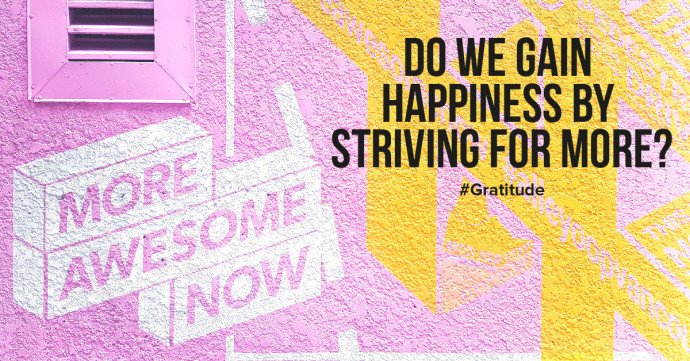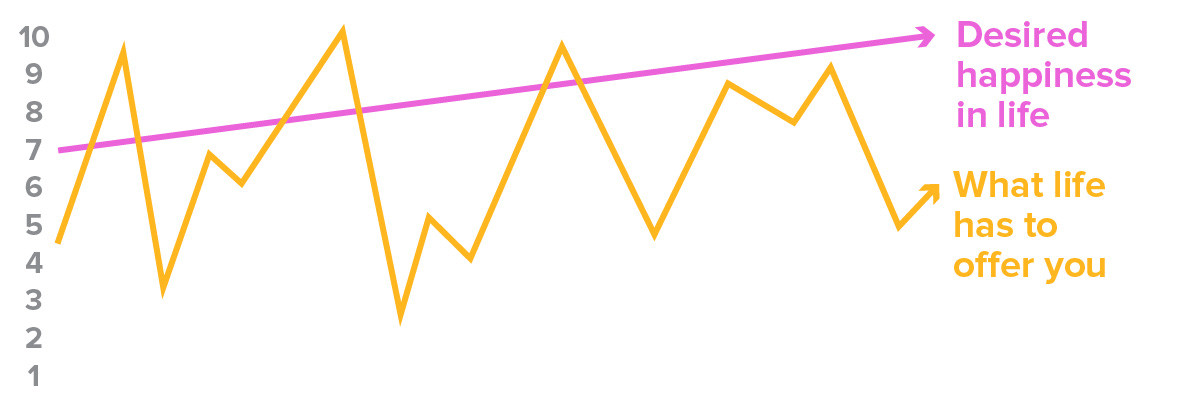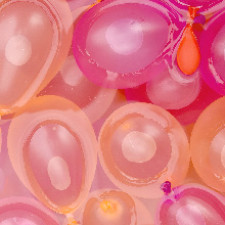Do we gain happiness by striving for more, better and more beautiful?
__We can be so different in terms of religion, education, income, or environmental conditions, but we all have one thing in common — we all want to live a happy life. How and with what we experience happiness may differ, but we all strive for happiness.
How is it possible that some people have been given this happiness and others have not? And how is it possible that people can have everything to live a happy life, but still are not happy, while other people who have all the bad luck in the world can sometimes shine in happiness?__

Happiness is not in what you do or possess
As a child in second-grade primary school, I had to get good grades. At first, I thought it was because I wanted to, but later I understood that the incessant urge to perform was not inborn. It was based on the conviction of my parents that with good grades at school, I would be all right in the future. Then I would be happy! The parents' evening at school at which, with a bit of luck, you would get candy if your grades were good and a few slaps if they weren't, has undoubtedly contributed to this.
When I had my first leaflet district around nine years old, I was proud to be able to buy my first polo shirt finally. From that moment on, no plastic apple pictures over the cracks in my pants and blouses.
Blouses that were usually too small or too big, because four others always wore them. Those four were my older brothers and must have thought the same thing at some point. A new polo would make me happy, and the plastic apples made me unhappy.
So my happiness couldn't stop thanks to my brand new red polo shirt with one of those collars that you could put up. I walked around in it for 14 days until one of the popular girls at school secretly whispered that he really had to be washed once because my polo shirt and I started to have a bad smell. That the whole schoolyard looked up because they could hear her whispering didn't matter to her. It was a bit of well-intentioned advice, and she was right, but unfortunately, my happiness was of short duration.
A few years later, most of my friends had a Nintendo game console. I was already happy with a set of new pencils to become the successor of the famous car designer Pininfarina. Unfortunately, I couldn't resist the temptation to break open my piggy bank again.
They have a game console, so I have a game console. Because then I'm part of the team and I'm happy again. Of course, I could never pay for a large Nintendo game console like that, but I could pay for the small version with the Donkey Kong game. No more savings, but a cool game. I also enjoyed that for at least two weeks. It took me another six months to refill my piggy bank.
Wanting something better isn't necessarily wrong
It's in human nature to create and improve something. That one meal might be even tastier next time. That painting or photo can make an even more significant impact, and that conversation with that friend can be even more personal and intense.
There can be more laughter, we can learn to understand something a little better, and we can also improve ourselves by, for example, becoming more social or more open.
But there is a big difference between wanting to make something better or more beautiful out of the happiness we experience and wanting something better and more beautiful because we think that's what gives us happiness.
I learned the wrong lesson that the better grades because my parents wanted it, the cool t-shirt, and the cool game console because I then belonged to the group was needed to make my life more abundant and, therefore, happier. As if that way, I would have my happiness in my own hands.
Unfortunately, I wasn't making my life richer and more enjoyable, I was filling the gap that I couldn't fill with inner happiness with madness. But at that age, I couldn't know any better, so I went on for a while.
Years later, I had a car to get from A to B, yet it had to be replaced by a more beautiful car. When, after six months, the fully equipped and extended BMW 7 series was no longer enough to give me a feeling of happiness, a Lotus Elise had to be purchased.
When the Lotus Elise was no longer enough, I had to live in a villa to feel happy. A once so cozy holiday with my girlfriend to a cheap all-inclusive resort was exchanged for a 300 Euro per night private apartment with a private pool in Asia, and my closet was full of polos from every brand that were laundered daily. I wanted more and better because that makes me so happy... I thought. Although I did not know why.
Always wanting more doesn't make you happy
Provided we're healthy; we're all born happy. We need nothing more than motherly love and food. The more we become aware of our environment and the more impact our environment has on us, the more we can be inclined to get happiness from making, owning or doing something "more", "better" or "more beautiful". As if life should never be less.
Imagine that an average person on a scale of 1 to 10 can live happily. 1 is so unhappy that you want to die, and 10 is the best time of your life. If you have a life at the happiness level of a 7 or 8 for a few months on average, then you can speak of happiness.
But once this level is reached, we don't want to do it for less. It has to be more and more. A better holiday, a more delightful experience, a nicer girlfriend, or a more impressive and challenging job. Less makes us unhappy.
We're on a high level of happiness, and that can't go down, so we're looking for new impulses to keep our sense of happiness high. And we seek those impulses mainly in the direction of the outside world and with external impulses. It has to be more exciting, more challenging, and above all, more exuberant.
What does a 'boring' weekend look like?
Imagine coming to work on Monday and someone asking what your weekend was like. You have decided to read a thick book from Friday afternoon and take it easy. A little cooking for yourself on Saturday evening and maybe on Sunday morning, a walk through the forest, but because of the bad weather, you continued reading.
You even had time for a little meditation. Your answer on Monday morning may be that you have done nothing. "Lovely under the wool with a book alone at home and a little meditation".
How do you think your colleagues react? Could it be: "How wonderful!" Or would it be a reaction like this; "Are you all right!?"
Life is not a flat-line of happiness through more, better, or more beautiful
Our happiness in life is fluctuating. Whether we like it or not. Sometimes it's a big two, and sometimes we can experience a ten. But if we always want the 10, we need a whole lot of stimulating impulses.

Unless we are content with who we are and what we have. We can learn that happiness is not in your status, possession, knowledge, achievements, or that crazy career. We can also learn that happiness is not in who you know and how popular you are with your red polo shirt, but that happiness has its roots in the fact that you can be who you are. Then, and only then, can you strive for continuous level 7 or 8 happiness and perhaps achieve it as well.
The power of gratitude and appreciation to be happy
We all know the feeling that arises when we receive something out of love. Whether it is a visit from a good friend or a spontaneous and valuable gift, we will feel a sense of gratitude and appreciation. Most of us will feel a sense of happiness at the same time. That is what the valuable gift of gratitude brings us. Happiness.
Brother David Steindl-Rast is a monk who has an interesting philosophy about this. According to him, we spontaneously become happy when we get something that we do not influence if we get it, what is valuable to us, and what is useful to us.
Unfortunately, most of us don't live in a situation where we get such gifts from someone every day. But that doesn't mean, according to David, that we can't live thankfully and therefore happily.
We can decide to see and experience our lives and everything that happens in them as a gift. Every day we get up, and the sun shines, or the rain falls. Every day we wake up, there is another day without having had any direct influence on it.
As long as we are healthy, we can experience this as a valuable gift that we get, and that is of value to us. By living in gratitude in this way, happiness arises as a matter of course.
Why are some people always happy?
People who are always happy realize that life is not self-evident, according to Brother David. His idea that I can wholeheartedly endorse is that we run through life without the necessary gratitude that what we have been given is deserved.
By striving for more, better, and more beautiful, we forget what we have already received. That is why he advocates the "stop-look-go" method.
The stop-look-go is something that every child learns at an early age when crossing a busy street. Stand still once in a while, look around for what you do have, and if you can be thankful for it, then go back to what you did. You will find yourself wanting much less more, more beautiful, and better, and that will most likely guarantee you a very happy life.
-
Rey KetenLife Coach & Mentor€ 0,83 pm
-
Monisha DoleyLife coach, author€ 0,74 pm
-
Fabio RomanoProfessional Coach€ 1,15 pm
-
Alina TudoracheNLP Happiness Coach€ 0,58 pm
-
Destiny Kolberghelp people be happy€ 0,05 pm
-
Charlena CrawfordCoaching clients€ 0,85 pm


































